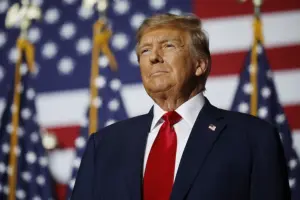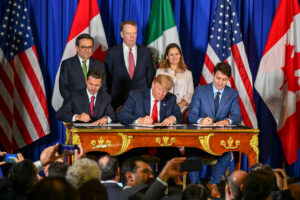As trade negotiations approach, South Korea hopes its significant shipbuilding capabilities can mitigate the proposed tariffs on its exports.
**South Korea Leverages Shipbuilding Expertise in Upcoming Trade Talks with U.S.**

**South Korea Leverages Shipbuilding Expertise in Upcoming Trade Talks with U.S.**
In light of potential tariffs, South Korea aims to showcase its shipbuilding industry to appeal to U.S. interests.
South Korea is gearing up for crucial trade discussions with the United States, hoping to utilize its robust shipbuilding sector as a strategic advantage. Facing the threat of a steep 25 percent tariff on its exports, which include popular vehicles from Hyundai and Kia as well as steel, aluminum, and LG electronics, South Korean officials believe that aligning their shipbuilding expertise with President Trump’s vision of revitalizing U.S. maritime industry may provide them with leverage in negotiations.
As the world's second-largest shipbuilder after China, South Korea's officials intend to emphasize how its advanced shipbuilding capabilities can complement Trump's agenda. They expect to negotiate not only about tariffs but also include significant commitments for importing American liquefied natural gas (LNG), which could help reduce their trade surplus with the U.S.
Trade and Industry Minister Ahn Duk-geun emphasized the potential of shipbuilding as a "crucial negotiating card" while addressing the Parliament last week. Additionally, Choi Sang-mok, South Korea's finance minister, is scheduled to meet with Treasury Secretary Scott Bessent next week in Washington, indicating a proactive approach to negotiations.
Unlike other nations grappling with President Trump’s policies, South Korea has opted for dialogue rather than retaliation, aiming to foster constructive relations and navigate the potential economic impact of the tariffs effectively.
As the world's second-largest shipbuilder after China, South Korea's officials intend to emphasize how its advanced shipbuilding capabilities can complement Trump's agenda. They expect to negotiate not only about tariffs but also include significant commitments for importing American liquefied natural gas (LNG), which could help reduce their trade surplus with the U.S.
Trade and Industry Minister Ahn Duk-geun emphasized the potential of shipbuilding as a "crucial negotiating card" while addressing the Parliament last week. Additionally, Choi Sang-mok, South Korea's finance minister, is scheduled to meet with Treasury Secretary Scott Bessent next week in Washington, indicating a proactive approach to negotiations.
Unlike other nations grappling with President Trump’s policies, South Korea has opted for dialogue rather than retaliation, aiming to foster constructive relations and navigate the potential economic impact of the tariffs effectively.






















